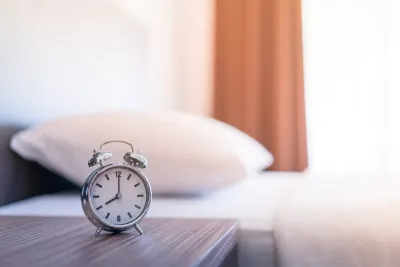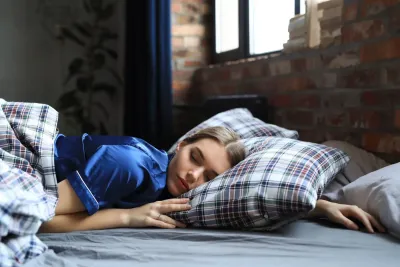Unlock Optimal Sleep: Understanding Your Circadian Rhythm
Chilipad Editorial Team • Jan 30, 2026

Key Takeaways
Your circadian rhythm is your body’s internal clock, and keeping it aligned supports better sleep, energy, and long-term health.
- Circadian rhythm regulates your sleep-wake cycle, hormone release, digestion, body temperature, and daily alertness patterns.
- Light exposure, especially morning sunlight and reduced evening screen time, plays a major role in keeping your internal clock aligned.
- Shift work, jet lag, irregular schedules, chronic stress, and late-night blue light can disrupt circadian rhythm and reduce sleep quality.
- Ongoing circadian disruption is linked to insomnia, metabolic issues, heart disease, mood disorders, and weakened immune function.
- Consistent sleep timing, morning light, regular meals, physical activity, and a cool, dark bedroom help strengthen and stabilize your rhythm.
Have you ever wondered why you feel sleepy at night and alert during the day, or why traveling across time zones can leave you feeling out of sorts?
The answer lies in your circadian rhythm.
A natural, internal process that regulates your sleep-wake cycle and repeats roughly every 24 hours. Understanding how this internal clock works can help you improve your sleep, mood, and overall health.
Try Chilipad for a Cooler, More Restful Night
If you’re looking to create the perfect sleep environment, consider the Chilipad, our temperature-regulating mattress pad that helps keep your bed cool all night.
What is the Circadian Rhythm and How Does it Work?
The circadian rhythm is a natural, internal 24-hour cycle that regulates the sleep-wake cycle and repeats roughly every day.
Often called the "body clock," it coordinates physical, mental, and behavioral changes that respond primarily to light and darkness in an organism's environment.
The Science of the Master Clock
The "master clock" that controls your circadian rhythm is the Suprachiasmatic Nucleus (SCN), a tiny structure located in the Hypothalamus.
The SCN consists of approximately 20,000 nerve cells and acts as the central command center for your biological timing.
How the Cycle Works: A 3-Step Process
Your rhythm functions through a continuous feedback loop between your environment and your biology:
- Light Reception: Specialized photoreceptors in your retinas (containing a pigment called melanopsin) detect changes in environmental light.
- Signal Transmission: These receptors send a direct signal through the retinohypothalamic tract to the SCN.
- Hormonal Response: In the Morning: The SCN triggers the release of cortisol and raises your core body temperature to promote alertness.
In the Evening: As light fades, the SCN signals the pineal gland to begin secreting melatonin, which lowers your core temperature and prepares the body for deep, restorative sleep.
Why it Matters for Health
When your circadian rhythm is properly aligned, you experience optimal sleep architecture, improved metabolic health, and peak cognitive performance.
However, circadian misalignment—caused by shift work, jet lag, or excessive blue light—can lead to chronic fatigue, mood disorders, and a weakened immune system.
How to Reset Your Circadian Rhythm: 5 Science-Backed Steps
Resetting your circadian rhythm—a process known as "entrainment"—requires aligning your internal biological clock with the external environment.
By using specific "Zeitgebers" (time-givers) like light, temperature, and food, you can shift your sleep-wake cycle in as little as 2–3 days.
To realign your internal clock—a process called entrainment—use these five biological "anchors" to sync your brain with your environment.
1. Prioritize Early Morning Sunlight
View natural sunlight within 30–60 minutes of waking to anchor your rhythm.
- The Science: Light triggers the Cortisol Awakening Response (CAR) and suppresses melatonin.
- The Goal: Aim for 10–30 minutes of direct outdoor light, even on cloudy days.
2. Implement a "Blue Light Curfew"
Avoid artificial blue light (450–490nm) from screens in the evening.
- The Science: Blue light delays Dim Light Melatonin Onset (DLMO), tricking your brain into thinking it is daytime.
- The Goal: Dim household lights and stop screen use 2 hours before bed.
3. Leverage the "Temperature Drop"
Lower your core body temperature to initiate deep sleep cycles.
- The Science: A drop of 2°F (1°C) signals the Suprachiasmatic Nucleus (SCN) that it is nighttime.
- The Goal: Keep your bedroom at 65–68°F or use a cooling sleep system like the Chilipad to automate this signal.
4. Maintain Consistent Meal Timing
Eat your final meal early to sync your metabolic "peripheral clocks."
- The Science: Late eating causes circadian misalignment between your liver/gut and your brain.
- The Goal: Finish your last meal at least 3 hours before bedtime.
5. Fix Your Wake-Up Time (The Weekend Rule)
Wake up at the same time daily to prevent "Social Jet Lag."
- The Science: Drastic schedule shifts confuse the SCN, leading to the "Monday morning fog" (delayed cortisol).
- The Goal: Maintain a consistent wake time (within ±30 minutes), even on weekends.
How Circadian Rhythm Affects Sleep, Hormones, and Metabolism
Your circadian rhythm does much more than just control your sleep. It influences a wide range of bodily processes, from hormone release to digestion and even body temperature.
Circadian rhythm is your body’s internal clock that controls when you feel alert, sleepy, hungry, and ready to rest. When it stays aligned, sleep feels easier. When it drifts, everything from energy to mood takes a hit.
Circadian rhythms are common with almost all living things on the planet. Our bodies are guided by circadian rhythms, including our physiological processes and behavioral patterns. [1]
Sleep-Wake Cycles
The most obvious effect of your circadian rhythm is on your sleep-wake cycle. Circadian rhythms help regulate the sleep cycle by controlling hormone production and alertness levels, which directly affect sleep quality and timing.
Most people feel sleepy at night and alert during the day because their internal clock is synchronized with the natural light-dark cycle. However, external factors such as working night shifts, irregular schedules, or changes in light exposure can disrupt this rhythm.
This makes it difficult to get enough sleep and often results in less sleep overall.
Disruptions to the circadian rhythm can lead to sleep deprivation and sleep loss, especially for shift workers, causing problems like insomnia, daytime sleepiness, and reduced cognitive function.
Hormones, Digestion, and Body Temperature
Circadian rhythms also regulate the release of hormones such as cortisol (which helps you wake up) and insulin (which helps control blood sugar). These rhythms coordinate various body processes, including hormone release, digestion, and cardiovascular function.
Your digestive system follows a daily rhythm, too, with certain times of day being better for eating and digesting food. Even your core body temperature fluctuates throughout the day.
This vital biological marker is regulated by circadian rhythms, typically dropping at night to help you sleep and rising in the morning to help you wake up.
Circadian rhythms also influence blood pressure, which changes throughout the day in response to your internal clock and can impact cardiovascular health.
What Disrupts Your Circadian Rhythm?
Circadian misalignment occurs when your internal biological clock is no longer synchronized with your external environment.
While robust, this system is highly sensitive to modern "Zeitgebers" (environmental cues) that can delay or advance your sleep-wake cycle.
Primary Circadian Disruptors
These factors are the most common causes of rhythm fragmentation:
- Shift Work & Irregular Hours: Working during "biological night" forces the brain to resist its natural drive for sleep, leading to chronic fatigue and metabolic stress.
- Jet Lag: Rapid travel across multiple time zones creates a temporary mismatch between your internal clock and the new local time.
- Social Jet Lag: Frequently changing your bedtime or wake time (common on weekends) confuses the Suprachiasmatic Nucleus (SCN) and causes "Monday morning fog."
- Artificial Light at Night (ALAN): Exposure to blue light (450–490nm) from screens and LEDs suppresses melatonin production, tricking your brain into thinking it is still daytime.
- Insufficient Morning Light: Spending the majority of your time indoors prevents the body from receiving the high-intensity light cues needed to "reset" your clock each morning.
Other Factors
- Environmental Temperature: Sleeping in a room that is too warm prevents the natural core body temperature drop required to trigger sleep onset.
- Chronic Stress: Elevated cortisol levels at night directly compete with melatonin, keeping the body in a state of high alertness.
- Late-Night Feeding: Eating close to bedtime disrupts the "peripheral clocks" in your gut and liver, leading to metabolic misalignment.
Health Consequences of Disrupted Circadian Rhythms
When your circadian rhythm is out of sync, it can have wide-ranging effects on your health.
Circadian rhythm disorders, which occur when the body's natural sleep-wake cycle is disrupted, can lead to various sleep problems and may indicate underlying health issues.
Chronic disruption has been linked to sleep disorders, depression, obesity, diabetes, heart disease, and even some cancers.
Circadian disruption is also associated with high blood pressure and other cardiovascular risks, with research suggesting that timing treatments according to circadian biology can improve outcomes for conditions like hypertension.
For example, studies have found that shift workers are at higher risk for metabolic and cardiovascular problems, likely due to ongoing circadian misalignment.
Night owls may have a 16% higher risk of heart attack and stroke compared to early risers.
Poor sleep quality and irregular sleep patterns can also weaken your immune system and affect your mood and cognitive performance.
Overall, disruptions to circadian rhythms can negatively impact human health by affecting hormonal balance, increasing oxidative stress, and contributing to the development of psychiatric, sleep, and cardiovascular disorders.
What are Circadian Rhythm Sleep Disorders?
Circadian rhythm sleep disorders occur when your body’s internal clock is out of sync with the world around you, leading to ongoing problems with sleep patterns.
These disorders can make it difficult to fall asleep, stay asleep, or wake up at the desired times, even when you try to keep a regular schedule. Common causes include irregular sleep routines, frequent travel across time zones (resulting in jet lag), and working night or rotating shifts.
Shift work, in particular, can disrupt the body clock and make it hard to maintain healthy circadian rhythm sleep. Over time, these disruptions can lead to chronic sleep disorders, daytime sleepiness, and a decline in overall well-being.
Recognizing the signs of circadian rhythm sleep disorders is the first step toward finding solutions and restoring your body’s natural rhythm.
How to Keep Your Circadian Rhythm Healthy
The good news is that you can support your circadian rhythm with some simple daily habits and lifestyle changes.
Daily Habits for a Stronger Rhythm
- Stick to a Consistent Sleep Schedule: Go to bed and wake up at the same time every day, even on weekends.
- Get Morning Sunlight: Exposure to natural light in the morning helps reset your internal clock and boosts alertness.
- Limit Evening Light Exposure: Dim the lights and avoid screens for at least an hour before bedtime to encourage melatonin production.
- Be Mindful of Caffeine and Meals: Avoid caffeine late in the day and try to eat meals at regular times to help your body stay on schedule.
- Stay Active: Regular physical activity, especially earlier in the day, can help regulate your sleep-wake cycle.
Creating a Restful Sleep Environment
- Keep Your Bedroom Dark and Cool: Darkness signals your body to produce melatonin, while a cooler room temperature supports better sleep.
- Limit Noise: Use earplugs or white noise machines if you’re sensitive to sounds.
- Reserve Your Bed for Sleep: Avoid working or watching TV in bed to strengthen the mental association between your bed and sleep.
When to Seek Professional Help
If you consistently struggle with sleep, feel tired during the day, or suspect a sleep disorder, it may be time to talk to a healthcare provider.
Conditions like insomnia, delayed sleep phase disorder, or shift work disorder can often be managed with professional guidance.
For persistent sleep issues, consider consulting a sleep specialist, who can diagnose and treat circadian rhythm sleep disorders with targeted therapies such as light therapy, melatonin, or behavioral adjustments.
The Power of Staying in Sync
Your circadian rhythm is a powerful force that shapes your sleep, health, and daily functioning. By understanding how it works and making small changes to support it, you can improve your sleep quality, mood, and long-term well-being.
Frequently Asked Questions About Circadian Rhythm
What Is Your Circadian Rhythm?
Circadian rhythm is your body’s internal 24 hour clock that tells you when to sleep, wake up, eat, and feel alert. It is mainly guided by light and darkness and helps keep your sleep and daily functions on a regular schedule.
How long does it take to reset circadian rhythm?
Resetting your circadian rhythm usually takes a few days to two weeks, depending on how disrupted it is. Consistent sleep times, morning sunlight, and limiting light at night help your body adjust faster.
Can circadian rhythm affect mood?
Yes. When your circadian rhythm is out of sync, it can affect mood, focus, and emotional stability. Disruptions are linked to higher risk of anxiety, irritability, and depression, largely due to poor sleep and hormone imbalance.
Does circadian rhythm change with age?
Yes. Circadian rhythm shifts as you age, often causing earlier bedtimes and wake times. Older adults may also produce less melatonin, which can make sleep lighter and more fragmented.
Can naps disrupt circadian rhythm?
Yes, long or late naps can interfere with your circadian rhythm. If you do it late in the day or nap for more than 30 to 60 minutes can reduce sleep pressure and make it harder to fall asleep at night. Read our blog to get a better understanding of naps.
What Can Disrupt Your Circadian Rhythm?
Your circadian rhythm can be disrupted by:
- irregular sleep schedules
- artificial light at night
- screen use before bed
- travel across time zones
- night shift work
- late caffeine or meals
- and limited exposure to natural daylight.
Peer-Reviewed Research References
-
National Institute of General Medical Sciences (NIGMS).
Circadian Rhythms.
Source Type: U.S. Government Biomedical Education Resource
Key Insight: Defines circadian rhythms as internal biological processes that regulate physical, mental, and behavioral changes over a 24-hour cycle, influencing sleep, hormone release, metabolism, and body temperature.









